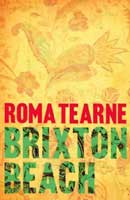

Harper Press (UK), hardcover, 9780007301546
Harper Collins (Can), paperback, 9780007301553
Visual artist and writer Roma Tearne is back with her third novel, Brixton Beach, and once again her evocative language shimmers and quivers on the page as she beautifully transfers her artistic visualizations to the written word. In this novel, she takes us to both her native Sri Lanka and her adopted Britain. This story begins and ends with the 2005 terrorist bombings in London; between these bookends is the story of 9-year-old Alice, daughter of a Tamil father and a Singhalese mother living in what was then Ceylon at the outbreak of the civil war in the early 1980s. Alice is a misfit at school – mistrusted by the Tamil children and shunned by the Singhalese. Much of the novel focuses on the solace Alice finds in her nurturing grandfather, Bee. His lesson that it's the person who matters, regardless of cultural affiliations, echoes throughout the story. This is a message that Alice takes with her when her family immigrates to England, which they expect to be the "land of the Just." Although Alice's family finds safety in London, they are not able to leave behind their feelings of alienation. Like many immigrants, they have mixed success fitting into their new surroundings.
In Brixton Beach, her earlier novels, and her visual art, Tearne expresses her
obsession with loss, longing, and memory, specifically as they relate to the experience of
immigrants. Grandfather Bee says that "absence is also a presence," and in this novel what
isn't said and isn't explained is often more important than what is spelled out. Tearne
also explores themes of identity confusion and belonging. A part of this exploration
is a look at how places influence people and in turn how people are vital in influencing
places. A friend tells Alice: "You are Ceylon... whenever someone from this place leaves,
a little bit of it leaves with them, and is lost forever. If too many people leave Ceylon,
it will become another sort of place entirely." This reflection makes me wonder what Sri
Lanka would have become if it had not lost so many citizens to immigration and war.
As depicted in Brixton Beach and in Tearne's debut novel Mosquito, the
country is a paradise with an idyllic climate, stunning landscapes, endless beaches,
historical sites, and delectable cuisine; it has the exotic aspects of India and Southeast
Asia without the dire poverty. A 30-year civil war has prevented Sri Lanka from becoming
the tourist haven it might have otherwise become. Although the Singhalese government declared
victory in the war this past May, my government [Canada] has not removed its high-level travel
advisory. I may never have the opportunity to travel to Sri Lanka in real life, but I can
always let Roma Tearne take me there with her novels.